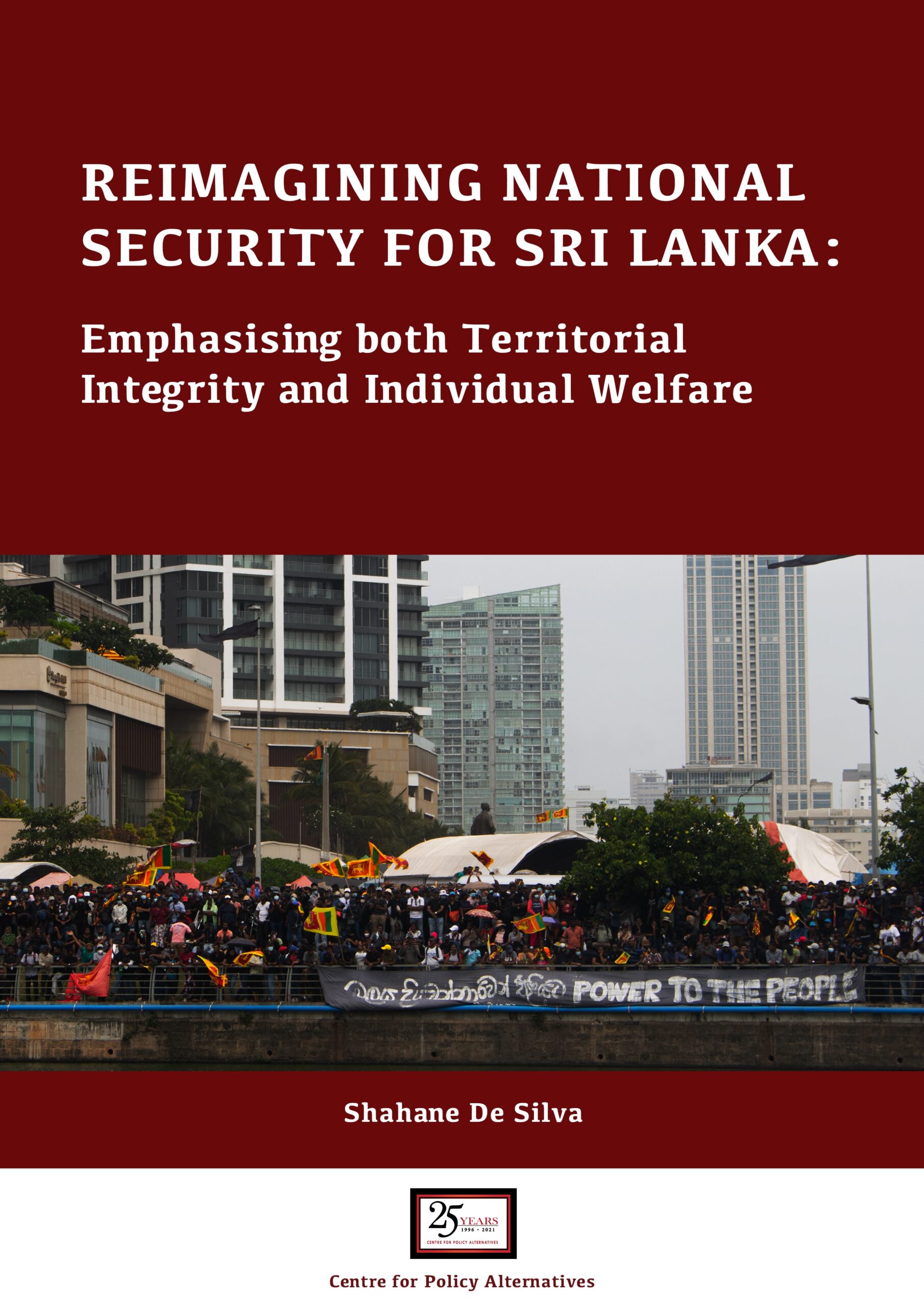For years, Sri Lanka’s approach to national security has been rooted in traditional military defense—protecting borders, maintaining a strong armed force, and responding to internal conflicts. However, this narrow perspective has often failed to address the real threats that affect the everyday lives of Sri Lankans. Terrorism, economic instability, climate change, and cyber threats are just as dangerous—if not more so—than an armed invasion. In his book, Reimagining National Security for Sri Lanka: Emphasising both Territorial Integrity and Individual Welfare, Shahane De Silva argues that national security must evolve to encompass not only territorial protection but also the well-being of citizens.
This reimagined approach combines traditional security (focused on sovereignty and military defense) with human security (prioritizing economic stability, food security, healthcare, environmental protection, and political freedom). Without this balance, the state may remain intact, but its people will continue to suffer from instability, fear, and uncertainty.

The Limits of Traditional Security
Sri Lanka’s history has been marked by a long and brutal civil war, acts of terrorism, and political instability. In response, the government has heavily prioritized military spending and defense strategies. But does protecting borders and maintaining a strong military necessarily make a country safe? Recent history suggests otherwise.
Despite the end of the civil war in 2009, Sri Lanka has continued to face security challenges that cannot be solved through military force alone. The devastating Easter Sunday attacks in 2019 revealed weaknesses in intelligence and counterterrorism efforts, while increasing political and economic instability has led to widespread protests and social unrest. A country may have an impenetrable military, but if its citizens live in fear—whether of violence, poverty, or lack of access to basic needs—can it truly be considered secure?
Modern Threats Demand a Modern Approach
De Silva argues that national security must address a wider range of contemporary threats:
1. The Rise of Terrorism and Extremism
Sri Lanka remains vulnerable to extremist ideologies and radicalization. Terrorism cannot be fought with weapons alone—it requires legal reforms, intelligence-led policing, and addressing the root causes of extremism, such as economic disparity and social marginalization. The book recommends:
Strengthening the National Security Council and giving it a statutory basis with a dedicated National Security Advisor.
Replacing the outdated Prevention of Terrorism Act with new counterterrorism laws that align with international human rights standards.
Creating a Public Prosecutor’s office independent from political influence to ensure justice in security-related cases.
2. Cybersecurity: The Invisible Battlefield
The digital world is now a major frontier for security threats. Cyberattacks on government institutions, financial systems, and infrastructure can cause chaos without a single bullet being fired. Sri Lanka needs to:
Strengthen cyber defense capabilities within both the military and government.
Establish a dedicated military branch for cyber warfare.
Update national policies and legislation on cybersecurity to prevent cybercrime and digital espionage.
3. Climate Change: A Security Crisis in Disguise
Sri Lanka is highly vulnerable to climate change, with rising temperatures, unpredictable rainfall, and frequent natural disasters threatening both the economy and public safety. Climate change is not just an environmental issue—it is a national security risk. Food and water shortages, displacement due to disasters, and conflicts over natural resources can destabilize the country. Instead of focusing only on mitigation, Sri Lanka must prioritize adaptation strategies such as:
Investing in disaster preparedness and early warning systems.
Strengthening local governance to implement region-specific climate policies.
Expanding the blue economy (sustainable use of ocean resources) and green finance as economic drivers.
4. Economic Stability as a Pillar of Security
Sri Lanka’s economic collapse in recent years has demonstrated that financial instability can be just as dangerous as war. The country’s reliance on foreign debt, mismanagement of resources, and lack of economic diversification have made it highly vulnerable to external pressures. Economic security means ensuring that citizens have stable incomes, food, and basic services—without it, social unrest and mass protests become inevitable.
5. Overhauling Defence Spending: Smarter, Not Bigger
Sri Lanka’s military spending remains disproportionately high, even in peacetime. The book argues that the government should:
Reduce the number of active-duty troops while increasing reserves.
Shift defense priorities from the army to the navy, since Sri Lanka’s biggest security threats now come from maritime issues such as illegal fishing, human trafficking, and piracy.
Reallocate resources toward cyber defense and intelligence gathering rather than sheer military strength.
The Role of Institutional Reforms
No security strategy will work if the institutions responsible for enforcing it are weak or corrupt. To create a truly secure Sri Lanka, major institutional reforms are necessary:
Depoliticizing the foreign service to ensure diplomacy is driven by national interest rather than political agendas.
Strengthening parliamentary oversight on national security to ensure accountability.
Implementing stricter laws on political financing to prevent foreign interference in elections.
The Future of Sri Lanka’s Security
Security is no longer just about guarding borders—it is about creating a country where people feel safe in their daily lives. Without food, stable jobs, healthcare, and protection from digital and environmental threats, military strength alone will not prevent instability.
Shahane De Silva’s book makes it clear: Sri Lanka must rethink what security means in the modern world. A holistic approach—balancing state protection with individual welfare—is the only way forward. If the government fails to adapt to these new realities, it risks leaving the country vulnerable to both internal and external crises.
For those interested in a deep dive into this reimagined approach, Reimagining National Security for Sri Lanka, published by the Center for Policy Alternatives, offers a crucial roadmap for the country’s future. The question is: Will Sri Lanka act before it’s too late?







